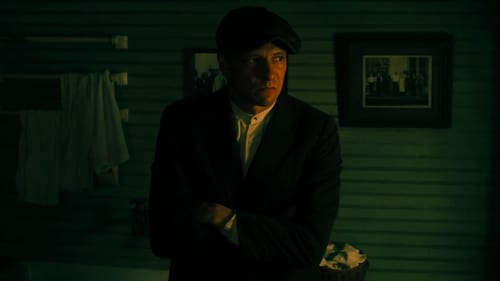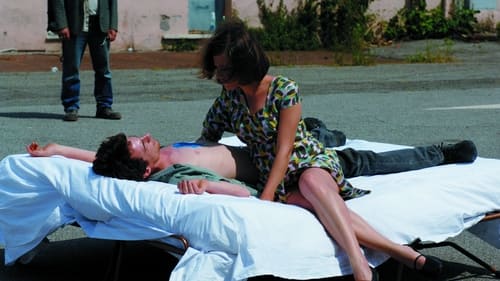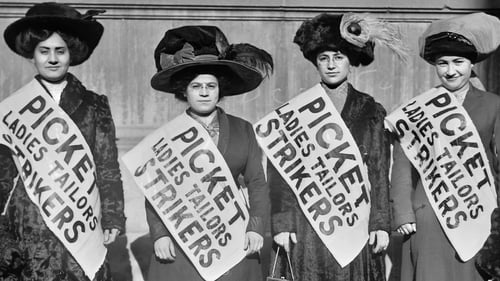遭難フリーター (2009)
ジャンル : ドキュメンタリー
上映時間 : 1時間 9分
演出 : Hiroki Iwabuchi
シノプシス
The director, twenty-three-year-old Iwabuchi Hiroki, is a permanent part-timer who on weekdays does menial work at a factory for 1,250 yen an hour, and on weekends takes on casual temporary work in Tokyo, a city he is fascinated with. He joins a demonstration demanding rights for permanent part-timers, and is featured on TV as "a poor, unhappy temporary worker." Despite having made his own choice to live as a permanent part-timer, he says that "the days feel like drowning in shallow water." But during the diary-like documentation of his life, something changes...

Filmed in the coal country of West Virginia, "Matewan" celebrates labor organizing in the context of a 1920s work stoppage. Union organizer, Joe Kenehan, a scab named "Few Clothes" Johnson and a sympathetic mayor and police chief heroically fight the power represented by a coal company and Matewan's vested interests so that justice and workers' rights need not take a back seat to squalid working conditions, exploitation and the bottom line.

Now 25, brilliant Marta seems to have her whole life ahead after majoring in philosophy, but she has to face the ugly truth for young graduates in Italy: a complete lack of work opportunities outside of temp jobs. While babysitting for single mother Sonia, she starts to work at the call center of a company selling junk to housewives, quickly rising through its ranks and experiencing first-hand the fanatical and exploitative competition culture pushed on young employees. Around her revolve other people, like delusional supervisor Daniela, her boss Claudio, fragile coworker Lucio, and well-meaning but inconsistent union official Giorgio.

During 2004 alone, 1400 people in Italy died at their workplace. 3,87 per day. This is the story of one of them.

In a company trading maté, workers are treated as slaves. Some of them try to escape, but those who are caught suffer severe punishments.

This powerful documentary explores the cruel realities of sweatshop labor and workplace injury in China, and one lawyer's mission to defend worker's rights.

When Umi and Dwipa left Indonesia to work in an Ontario greenhouse as part of Canada's Temporary Foreign Worker Program, they hoped the jobs would provide the opportunity and income for a better life. They didn't expect that fixers and false promises would lead to deception and exploitation. Sadly, their story is not uncommon. Min Sook Lee continues to speak truth to power with her commitment to providing a voice to the silenced, fulfilling documentary's capacity as a powerful tool for social change.

Farewell Ferris Wheel explores how the U.S. Carnival industry fights to keep itself alive by legally employing Mexican migrant workers with the controversial H-2B guestworker visa.

Six widows demand compensation for the death of their husbands, who were killed during a worker's strike. The women are arrested and taken to the police quarters, where the authorities try to make them retract their statements, but it turns out they're not so easily intimidated.

The life of the cotton workers in the Chaco and its struggle for wages.

On March 25, 1911, a catastrophic fire broke out at the Triangle Waist Company in New York City. Trapped inside the upper floors of a ten-story building, 146 workers - mostly young immigrant women and teenage girls - were burned alive or forced to jump to their deaths to escape an inferno that consumed the factory in just 18 minutes. It was the worst disaster at a workplace in New York State until 9/11. The tragedy changed the course of history, paving the way for government to represent working people, not just business, for the first time, and helped an emerging American middle class to live the American Dream.

The director, twenty-three-year-old Iwabuchi Hiroki, is a permanent part-timer who on weekdays does menial work at a factory for 1,250 yen an hour, and on weekends takes on casual temporary work in Tokyo, a city he is fascinated with. He joins a demonstration demanding rights for permanent part-timers, and is featured on TV as "a poor, unhappy temporary worker." Despite having made his own choice to live as a permanent part-timer, he says that "the days feel like drowning in shallow water." But during the diary-like documentation of his life, something changes...

THE DEVIL'S FIRE is an original documentary from WSKG Public Television and filmmaker Brian Frey. Utilizing never-before-seen photographs and investigative archival material, the film tells the story behind the Binghamton Clothing Company's charismatic owner, Reed B. Freeman, and the young immigrant workers trapped in the deadly blaze that hot Tuesday in July of 1913.

Portugal, 1944. In a country oppressed by a brutal dictatorship, there are those who resist and mobilize the people to fight for bread and freedom, even if it cost them prison, torture or their lives.

Biographical portrait of the labor movement and left wing movement in Uruguay, "Conversations with Turiansky" combines two stories. The first portrays the son of immigrants, the engineer passionate about the mystery of electricity, the man in love, the movie buff. The other places the protagonist in his time: union struggles, the advance of authoritarianism, prison and the challenges of the present. In both are present the lucidity, commitment, discreet tenderness and humor of Wladimir Turiansky.

Gurwinder comes from Punjab, he’s been working for years as a farm hand in Agro Pontino, not far from Rome. Since he first came in Italy, he’s been living with the rest of the Sikh community in Latina province. Hardeep is also Indian, but her stress is Roman, and she works as a cultural mediator. She, born and raised in Italy, is trying to free herself from the memories of a family that emigrated in another age, while he is forced, against his faith, to take methamphetamine and doping to bear the heavy work pace, to be able to send money in India.

A documentary about unemployed workers in Walbrzych, Poland.

Women workers stand up to the toxic flower industry in Colombia.

Two foreigners meet in Barcelona and become friends after discovering that they both work in the same business: sex work. Their conversations offer an insider’s view into the differences between women and men in the sex industry.

For a book project, photographer Timothy Greenfield-Sanders took photographs of 30 stars of adult movies, each pair of photographs in the same pose, clothed and nude. This film records the photo shoots and includes interviews with the performers and commentary from eight writers (and John Waters). The actors and writers discuss economics, nudity and exhibitionism, careers, and private lives.













